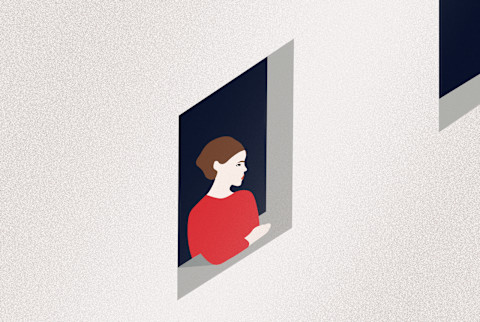There's A Link Between Loneliness & Type 2 Diabetes, Study Says

Loneliness is not only an emotional state, but it can also have major impacts on physical health. Everything from an increase in inflammation, pain, and certain diseases1 may be caused by loneliness. Now, a new study published in the journal Diabetologia says people who lack quality interpersonal connections could be at a higher risk of developing type 2 diabetes2, as well.
Researchers from King's College London analyzed data from 4,112 adults aged 50 years and over. At the start of the study, none of the participants had diabetes, and all of their blood sugar levels were within a healthy, normal range. At the end of the study (12 years later), 264 adults developed type 2 diabetes.
What does this have to do with loneliness?
Even when accounting for smoking and alcohol habits, as well as weight, blood sugar, blood pressure, and cardiovascular disease, people who reported experiencing loneliness were more likely to develop diabetes.
Surprisingly, people who lived alone or experienced social isolation and/or depression were not at an increased risk. While it may seem counterintuitive, the researchers say loneliness and social isolation are two separate things.
What's the difference between loneliness and social isolation?
Loneliness is defined by the quality of a person's relationships, Ruth Hackett, Ph.D., explains in a news release. In other words, it's possible to be surrounded by people and still feel lonely. This can happen if the people you're interacting with don't understand you, ask you questions about yourself, or fulfill your expected social needs. Conversely, social isolation describes being truly alone with no one to talk to or interact with.
The good news? Loneliness can be improved, even in the age of COVID-19. According to the researchers, helping people form positive relationships may be an effective prevention strategy for type 2 diabetes.
Why is this study so relevant?
In the wake of the COVID-19 pandemic, the concern here is twofold. On one hand, quarantine orders—on top of an existing loneliness epidemic—have exacerbated these feelings. Simultaneously, people with underlying medical conditions, like type 2 diabetes, are at an increased risk of poor outcomes from the virus.
"I came up with the idea for the research during the U.K. lockdown for the COVID-19 pandemic as I became increasingly aware and interested in how loneliness may affect our health," Hackett says, "especially as it is likely that many more people were experiencing this difficult emotion during this period."
Chronic loneliness, triggered by a loss of meaningful, in-person relationships can stimulate the stress system, she explains, and over time degrade the body. The researchers suggest this effect is what leads to an increased risk of diabetes.
Increasing quality connections, even through technology, is critical. Those who are feeling lonely may benefit from prioritizing phone calls or socially distant interactions with close friends, loved ones, or a mental health professional.
